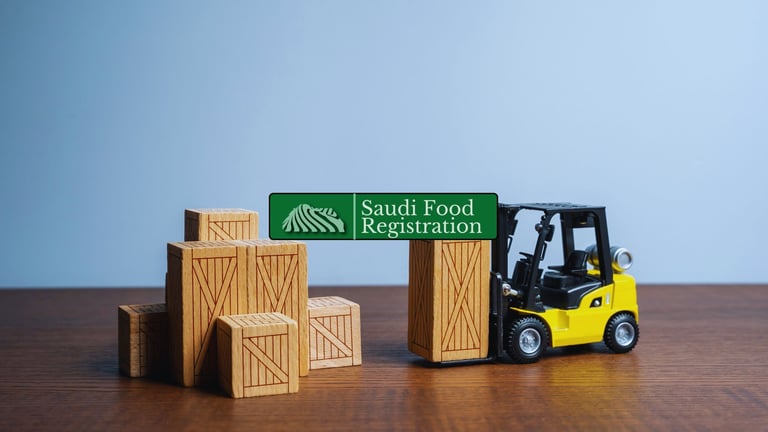Halal Logistics Certification
Get Halal Logistics Certification in KSA with Saudi Food Registration. Ensure SFDA compliance for food transportation, storage, and supply chain integrity.
3/7/20253 min read


Halal Logistics & Supply Chain Certification in Saudi Arabia:
Ensuring Compliance in Transportation & Storage
How can food businesses ensure Halal compliance in transportation, storage, and distribution?
If your business deals with Halal-certified food products, it’s not just production that matters—logistics, warehousing, and distribution must also comply with SFDA and GSO Halal regulations.
In this guide, we’ll answer key buyer intent questions and cover:
✔ What is Halal logistics certification, and why is it required?
✔ How do Halal supply chain regulations prevent contamination?
✔ What are SFDA & GSO Halal logistics requirements for businesses?
✔ How much does Halal logistics certification cost, and how long does it take?
✔ How can businesses streamline Halal certification for warehousing & transportation?
What is Halal Logistics & Supply Chain Certification?
Halal Logistics Certification ensures that food, beverages, pharmaceuticals, and personal care products remain Halal-compliant throughout the entire supply chain, including:
Transportation (land, sea, air) – Preventing cross-contamination between Halal and non-Halal goods.
Warehousing & Storage – Ensuring proper handling of Halal-certified products.
Cold Chain Management – Maintaining Halal integrity in temperature-controlled shipments.
🔍 Businesses in Saudi Arabia must comply with GSO 2055-1 (General Halal Requirements for Food) and SFDA’s Halal supply chain regulations to ensure market entry and prevent penalties.
Why is Halal Logistics Certification Mandatory in Saudi Arabia?
Saudi Arabia enforces strict Halal logistics regulations to protect consumer trust and ensure compliance with Islamic law. Certification is essential for:
Food & Beverage Distributors – Companies transporting Halal-certified products within Saudi Arabia & the GCC.
Warehousing & Cold Storage Providers – Facilities handling meat, dairy, beverages, and processed foods.
Exporters & Importers – Businesses shipping Halal-certified products to Saudi Arabia must prove compliance.
Pharmaceutical & Cosmetic Companies – Any products with animal-derived ingredients require controlled Halal storage & distribution.
🔍 Without Halal logistics certification, businesses risk shipment rejections, regulatory fines, and supply chain disruptions in Saudi Arabia.
How to Ensure Halal Compliance in Food Transportation & Storage
1. Dedicated Halal Storage & Warehousing
Store Halal and non-Halal products separately to avoid contamination.
Use proper labeling to distinguish Halal-compliant goods.
Maintain temperature-controlled storage to prevent product degradation.
2. Halal-Compliant Transport & Handling
Use designated Halal-certified trucks and containers for food shipments.
Prevent contamination by cleaning and sanitizing vehicles before Halal shipments.
Ensure strict cargo segregation policies in mixed shipments.
3. Certification for Third-Party Logistics (3PL) Providers
Third-party logistics companies handling Halal goods must be Halal-certified.
SFDA requires documented procedures for Halal product handling.
Businesses must audit logistics partners for Halal integrity.
🔍 Are your warehousing and transportation partners Halal-certified? If not, you could face SFDA non-compliance penalties.
Step-by-Step Process for Halal Logistics Certification in Saudi Arabia
Step 1: Compliance Assessment
Businesses must evaluate supply chain gaps in Halal compliance.
Review warehousing, handling, and transportation processes.
Step 2: Apply with an SFDA-Recognized Certification Body
Register with an SFDA-approved Halal certification authority.
Submit logistics documentation, supplier details, and facility reports.
Step 3: On-Site Facility & Vehicle Inspection
Inspectors verify cleaning procedures, cargo segregation, and transport protocols.
Warehouses and storage areas must pass Halal compliance checks.
Step 4: Laboratory Testing & Process Verification
Random product samples may undergo scientific testing for contamination risks.
Process flow must align with GSO 2055-1 Halal logistics standards.
Step 5: Certification Approval & Ongoing Compliance
Upon approval, businesses receive official Halal logistics certification.
Regular audits ensure continuous compliance with Saudi Halal laws.
⏳ How long does Halal logistics certification take? The process typically takes 6-10 weeks, depending on facility readiness.
Common Halal Logistics Compliance Challenges & Solutions
Issue: Cross-Contamination Risks
✅ Solution: Implement strict cleaning protocols and use designated Halal storage & transport units.
Issue: Lack of Halal-Certified Logistics Partners
✅ Solution: Work with SFDA-approved Halal-certified transport & warehousing companies.
Issue: Incomplete Documentation
✅ Solution: Maintain detailed logs on cleaning, handling, and cargo segregation procedures.
🔍 Want to avoid certification rejection? Our experts can audit your logistics operations before submission!
How Much Does Halal Logistics Certification Cost?
Certification costs vary based on supply chain complexity, facility size, and certification scope.
📌 Small logistics providers: SAR 20,000 - 35,000
📌 Mid-sized warehousing & distribution centers: SAR 35,000 - 60,000
📌 Large-scale logistics & cold chain operators: SAR 60,000+ (depends on the number of facilities & vehicles)
⏳ Typical certification timeline:
Facility & transport compliance review – 2-4 weeks
On-site inspection & audit – 4-6 weeks
Final certification approval – 6-10 weeks
🔍 How much will it cost for your business? Contact us for a customized quote!
How Saudi Food Registration Can Help
Our Halal logistics certification experts help businesses:
Ensure full compliance with SFDA & GSO Halal transport & storage regulations.
Prepare for audits & inspections to avoid certification delays.
Implement cargo handling & segregation policies to maintain Halal integrity.
Secure Halal logistics certification quickly to access Saudi & GCC markets.
📌 Need Halal logistics certification?
Contact us today or use our chatbot for instant assistance!
Related Reads:
GSO 2055-2 Halal Certification in Saudi Arabia – Understanding GCC-wide Halal regulations for food & logistics.
Animal-Based Halal Certification – Ensuring Halal compliance for gelatin, dairy, and meat-based products.
Food Labeling & Compliance in Saudi Arabia – How to ensure Halal-approved product labeling.
Halal certification for processing aids guarantees SFDA compliance and food safety in KSA.
Why Halal Logistics Certification is Essential in Saudi Arabia
Without Halal logistics certification, businesses risk SFDA non-compliance, shipment rejections, and regulatory fines.
Required for food distributors, importers, and exporters
Ensures Halal integrity from production to final delivery
Strengthens market access & builds consumer trust
💬 Need expert guidance?
Contact us today or chat with our compliance specialists online!
